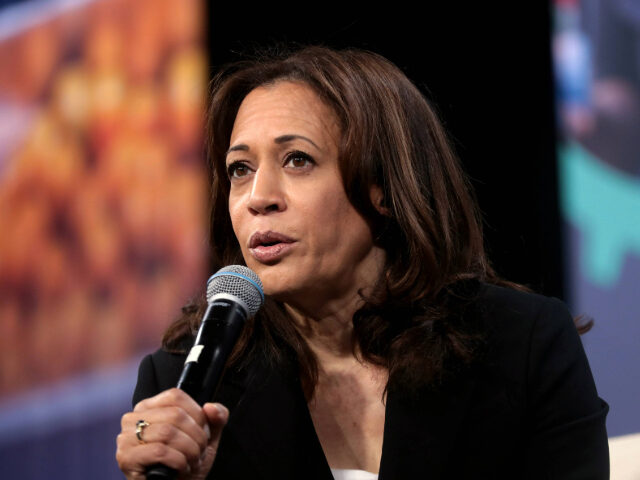CLAIM: “Donald Trump, when he was president, negotiated one of the weakest deals you can imagine,” Vice President Kamala Harris said to deflect criticism of how her administration handled the withdrawal from Afghanistan.
VERDICT: FALSE and MISLEADING. While calling a particular agreement “strong” or “weak” is a matter of opinion. There is objectively no doubt that the Harris-Biden withdrawal from Afghanistan violated the terms of the Doha Agreement negotiated with the Taliban by the Trump administration, prompting a wave of Taliban violence that culminated in the August 15, 2021, conquest of Kabul.
Harris suggested during remarks at Tuesday’s presidential debate that weaknesses in the Trump-era agreement that would have culminated in the withdrawal of U.S. troops from Afghanistan by May 2021 were responsible for the catastrophic return to power of the Taliban in that country during her tenure as vice president, which followed President Joe Biden announcing he would not abide by the withdrawal deadline and extend the 20-year war.
“He bypassed the Afghan government. He negotiated directly with a terrorist organization called the Taliban — the negotiation involved the Taliban getting 5,000 terrorists, Taliban terrorists released,” she said. “And get this, no, get this, and the president at the time invited the Taliban to Camp David, a place of storied significance for us as Americans, a place where we honor the importance of American diplomacy, where we invite and receive respected world leaders.”
“And this former president, as president, invited them to Camp David, because he does not, again, appreciate the role and responsibility of the President of the United States to be commander-in-chief with a level of respect,” Harris continued. “And this gets back to how he has consistently disparaged and demeaned members of our military, fallen soldiers, and the work that we must do to uphold the strength and the respect of the United States of America around the world.”
The House Foreign Affairs Committee just released a damning 300-page report that blasted Biden and Harris for breaking the agreement in sometimes inexplicable ways, evidently in a bid to rapidly pull American military forces out of Afghanistan while maintaining a large diplomatic presence there.
When the folly of this approach became apparent, Biden and Harris panicked, launching a string of blunders that ended with the death of 13 American service members in the Abbey Gate bombing at Kabul airport. However strong or weak the Doha Agreement might have been, the Biden-Harris approach was objectively weaker and it cost both Americans and Afghans their lives.
Donald Trump was present to honor the 13 fallen American service members, at the request of their families, on the third anniversary of the Kabul bombing. Kamala Harris and Joe Biden were not. The Gold Star families have blasted Biden and Harris for treating them with contempt.
Harris’s criticism of Trump for using Camp David to conduct diplomacy was somewhat self-refuting as she went on to rhapsodize the facility for its historic role in diplomatic negotiations. A previous president from Harris’s party, Bill Clinton, invited one of the worst terrorists in history, Yasser Arafat of the Palestine Liberation Organization (PLO), to Camp David in 2000.
Trump canceled what he himself referred to as a “secret meeting” between himself, the Taliban, and the head of the U.S.-supported civilian government of Afghanistan in September 2019. Trump did this because the Taliban had just perpetrated a terrorist attack in Kabul that killed an American service member, a Romanian service member, and ten civilians.
“I immediately canceled the meeting and called off peace negotiations. What kind of people would kill so many in order to seemingly strengthen their bargaining position? They didn’t, they only made it worse!” Trump said at the time.
The canceled Camp David meeting was an attempt to bring the civilian government of Afghanistan into negotiations – something the Taliban adamantly resisted because they said the administration in Kabul was merely a puppet of the United States and they wanted to deal directly with the superior power.
Harris offered no substantive criticism of the Doha Agreement and cited none of its details, but it was a lengthy document that included dozens of items. Among other things, the agreement repeatedly states that the United States did not, in any way, recognize the Taliban’s “Islamic Emirate of Afghanistan” as a state, or as the legitimate rulers of Afghanistan.
The House Foreign Affairs Committee report released on Monday criticized Biden and Harris for ignoring “the conditions in the Doha Agreement, pleas of the Afghan government, and the objections by our NATO allies” in their haste to “unilaterally withdraw from the country.”
The report does offer some criticisms of the Doha Agreement and the way it was negotiated, but it lays these criticisms at the feet of Special Representative for Afghanistan Reconciliation Zalmay Khalilzad. House investigators faulted Khalilzad for excluding both Afghan President Ashraf Ghani and “key military leaders” from decision-making, and said he “turned a blind eye to concerns by American officials that the Taliban were not negotiating in good faith.”
The Biden-Harris administration kept Khalilzad in place after Trump left office, and it doubled down on his habit of ignoring input from key military leaders, many of whom warned the White House that a hasty troop withdrawal would be unwise. These leaders warned Biden and Harris that the Taliban was cheating on the very agreement Harris derided as “one of the weakest deals you can imagine,” but they decided to pull out anyway.
“Despite the administration’s public commitment to assess the Taliban’s compliance with the Doha Agreement, it appears compliance with the agreement’s conditions was not pertinent to their Afghanistan policy,” the House report tartly noted.
Whatever the flaws of the Doha Agreement might have been, it was clearly misleading for Harris to blame it, or President Trump, for the botched Afghanistan withdrawal.

COMMENTS
Please let us know if you're having issues with commenting.